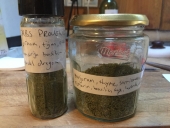This is something I started researching years ago, when I wanted to learn what plants and herbs I could
feed to my goats to help
boost their intake of vitamins and minerals. So many plants are toxic for goats, so I looked at lots of lists, as well as researched vitamin and mineral content for them. I feed them both fresh and dried, as a topping to their feed. This is in addition to their mineral salt. I live in the southeastern US, so while the list is somewhat tailored for my region, many of these plants are found elsewhere too. They're organized by nutrient because I have found myself working with nutrient deficiencies, and this was the easiest way to address them.
This list is a work in progress. If you have suggestions to add, please share!
Vitamin A (& beta carotene) - sweet potatoes, carrots, greens (kale, turnip, mustard, dandelion, spinach, collards), butternut squash, dried herbs (parsley, basil, marjoram,dill, oregano), fresh thyme, cantaloupe. Also raw grape leaves.
B vitamins Goats can synthesize their own B vitamins, so that supplementation is not strictly necessary. I'm including them here as part of my original information. B vitamin deficiencies, if they do exist are apparently more of a problem with goats fed a diet high in concentrates.)
B1 (thiamin): yeast extract, seeds (sesame, sunflower), dried sage, rosemary, thyme, and kudzu.
B2 (riboflavin): yeast extract, dried herbs (spearmint, parsley), wheat bran, sesame seeds, and kudzu.
B3 (niacin): yeast extract, bran (wheat & rice), and kudzu.
B5 (pantothenic acid): bran (rice & wheat), sunflower seeds
B6 (Pyridoxine): bran (wheat & rice), dried herbs (garlic, tarragon, sage, spearmint, basil, chives, savory, rosemary, dill, oregano, and marjoram), seeds (sunflower, sesame), molasses, sorghum, bananas
B9 (Folate): yeast extract, dried herbs (spearmint, rosemary, basil, chervil, marjoram, thyme, parsley), sunflower seeds, greens (spinach, turnips, collard), cowpeas, broccoli, wheat germ, cantaloupe, bananas, endive,
flax seeds
B12 (cobalamin): there are no plant sources for vitamin B12. However, goats can synthesize their own with cobalt. The only plant sources I've seen listed for cobalt are green leafy vegetables some herbs, with no specific details.
Vitamin C: (can also by synthesized by livestock) fresh thyme and parsley, greens (kale, mustard), broccoli,
rose hips, cantaloupe, tomatoes, dried basil, rosemary, and citrus (my goats love chopped citrus rinds).
Vitamin D: sunshine
Vitamin E: sunflower seeds, dried herbs (basil, oregano, sage, parsley, thyme)
Vitamin K: dried herbs (basil, sage, thyme, marjoram, oregano), fresh herbs (parsley, basil), greens (kale, dandelion, collards, turnip, mustard, beet, Swiss Chard), broccoli, cabbage, carrots, blackberries, blueberries, raspberries, figs
Calcium - Dried savory, celery seed, dried thyme, dried dill, dried marjoram, sage, oregano, spearmint, parsley, poppy seed, chervil, dried basil, comfrey, sesame seeds, flax seeds, raw turnip greens, Dandelion greens, Kale, Mustard Greens, amaranth leaves, collard greens, and kudzu. Also savory, spearmint, rosemary, chervil, fennel, coriander seed, chamomile, chicory, cleavers, coltsfoot, horsetail, mustard, sorrel, plantain, willow.
Cobalt - is the precursor to vitamin B12 and goats can synthesize their own B12 if they get cobalt in their diet. I have not been able to find a specific list of goat acceptable foods that are rich in cobalt (i.e. vegan). Several places vaguely mention green leafy vegetables and pulses, but cobalt is usually found in animal foods, which goats do not eat.
Copper - sesame, sunflower, pumpkin, & squash seeds, Dried Basil, Marjoram, Oregano, Thyme, Savory, and Parsley. Also coriander leaf, spearmint, fennel seed, dill, burdock, chickweed, chicory, cleavers, dandelion, fennel, garlic, horseradish, sorrel, yarrow.
Iodine - seaweed, especially kelp, also asparagus, cleavers, garlic.
Iron - Dried Thyme, dried Parsley, dried Spearmint, dried Marjoram, Cumin Seed, dried Dill, dried Oregano, dried Coriander, dried Basil, ground Turmeric, ground Savory, Anise Seed, Fenugreek Seed, dried Tarragon, dried Chervil, dried Rosemary, seeds (pumpkin, squash, sesame, sunflower, fenugreek, and fennel), and kudzu. Also bamboo, asparagus, blackberry, burdock, chicory, comfrey, dandelion,
nettle, parsley, raspberry, rose, scullcap, strawberry, vervain, wormwood.
Magnesium - Bran (Rice, Wheat, and Oat), Dried Coriander, Spearmint, Dill, Sage (not for milking does), Basil, Savory, seeds (pumpkin, squash, watermelon Flax, Sesame, & sunflower), and molasses. Also parsley, fennel seed, marjoram, oregano, dill & thyme, carrot leaves, dandelion, hops, marshmallow, meadowsweet, mullein, oak, slippery elm, rose.
Manganese - dried ginger, dry spearmint, parsley, dried marjoram, wheat germ, bran (Rice, Wheat, and Oat), seeds (pumpkin, squash, sesame, and sunflower). Also basil, thyme, fennel, coriander, savory, oregano, dill, and bamboo.
Phosphorous - bran, wheat germ, seeds (pumpkin, squash, sesame, sunflower, and flax), chickweed, dill, golden rod, marigold. [Note: pregnant does need a particular calcium to phosphorous ratio to prevent hypocalcemia.]
Potassium - spinach, Swiss Chard, Kale, Collards. bananas, parsley, dill, basil, rice bran, molasses, seeds (squash, pumpkin, sunflower, watermelon). Also chervil, coriander leaves, spearmint, fennel seed, marjoram, ginger, and oregano, borage, carrot leaves, chamomile, couch grass, dandelion, elder, honeysuckle, meadowsweet, mullein,
nettle, oak, peppermint, plantain, scullcap, wormwood.
Selenium - sunflower seeds, bran (wheat, oat, rice), garlic, chervil, fenugreek, ginger, and dried chervil, coriander, parsley, and dill seed.
Sodium - cleavers, clover, comfrey, dill, fennel, garlic, marshmallow, nettle, violet, woodruff
Zinc - wheat germ, seeds (pumpkin, squash, watermelon, sesame), and buckwheat. Dried herbs and seeds: chervil, basil, thyme, parsley, coriander, sage (not for milking does), savory, ginger, and seeds (dill, coriander, and fennel).

 5
5




 3
3




 3
3




 3
3




 4
4




 2
2




 2
2




 2
2





 2
2








